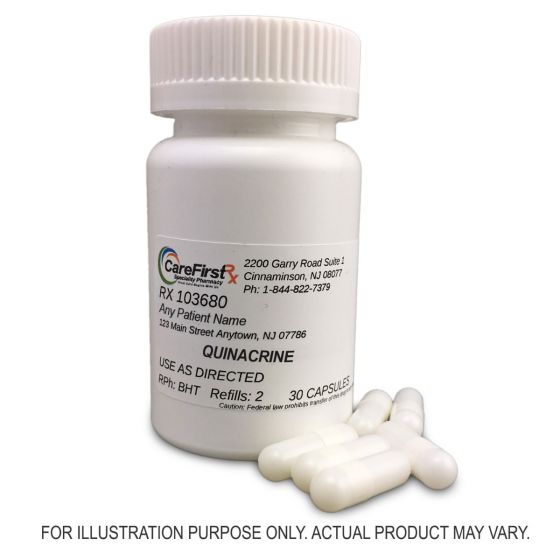Quinacrine Compounded
Quinacrine is an acridine derivative used to treat lupus and resistant giardiasis. It acts by inhibiting the inflammatory enzyme phospholipase A2, and by binding to giardia DNA, blocking it from being read. While not commercially available in the U.S., it can be made by compounding pharmacies. You may buy Quinacrine from CareFirst Specialty Pharmacy with a valid prescription from your prescriber.
This medication requires a prescription.
To process your order we will require a prescription from you or your Prescriber. We will only compound and dispense upon receipt of a valid patient specific prescription. Please note that our compounds are exclusively provided for individual patient and are not for office use.
- Your prescriber can mail or fax in the prescription
- You can mail in the original prescription
- We can contact your prescriber for you
- You can transfer your prescription from another pharmacy
Are you a licensed Prescriber?
- We have convenient ways to get your prescription to us:
- Fax to (800) 786-1405 or (844) 922-7379
- Send electronically (e-prescribe) by:
- Searching for CareFirst Specialty Pharmacy in Mount Laurel, NJ 08054
- Using our NCPDP# 3151266
- Phone into (844) 822-7379
- For more information about our products and services:
- Please complete the prescriber form online
- Email us at [email protected]
Looking for a Different Strength?
Contact us for a Quote.
We are a nationally accredited PCAB compounding pharmacy and a .Pharmacy verified website. A verified .Pharmacy website designation ensures our patients and prescribing partners that our website is verified and safe.
This is a compounded medication specifically made for you based on a prescription from your licensed physician.
Quinacrine is an acridine derivative used to treat lupus and resistant giardiasis. It acts by inhibiting the inflammatory enzyme phospholipase A2, and by binding to giardia DNA, blocking it from being read. While not commercially available in the U.S., it can be made by compounding pharmacies.
Although not approved commercially in the United States or Canada, quinacrine, also known as mepacrine in other countries, is available for compounding in the United States and may be compounded into oral dosage forms by certified compounding pharmacies. It was originally used under the brand name Atabrine to fight protozoal infections such as giardiasis especially in patients who were resistant to metronidazole. It has also been used to treat systemic lupus erythematosus (lupus), and to prevent recurrence of pneumothorax in patients at high risk especially those with cystic fibrosis. Quinacrine has been used in India and southeast Asia to induce female sterilization. This use is not clinically studied and quinacrine should NOT be used for this indication.
Pronunciation: (KWIN-uh-krin)
Other Names: Mepacrine (international) or Atabrine (brand name)
Drug Class: Antiprotozoal, Antirheumatic, Intrapleural Sclerosing Agent
Mechanism of Action: The exact mechanism of quinacrine’s antiprotozoal effects is unknown, but quinacrine does bind to DNA in vitro and is placed in between base pairs inhibiting transcription and translation of DNA to RNA. It also is known to affect the electron transport chain necessary to the Kreb’s cycle: the process by which aerobic organisms create energy from oxygen and other organic molecular precursors.
Drug Interactions: Do not drink alcohol on this medication. It has been shown that quinacrine produces a mild disulfiram-like reaction causing patients to vomit and have flu-like symptoms if alcohol is administered with quinacrine.
Do not take quinacrine with primaquine. Quinacrine may increase blood concentrations of primaquine inducing adverse effects of primaquine.
Do not take quinacrine if you have psoriasis.
Tell your doctor if you have: Pelvic pathologies including adnexal tumors, pelvic inflammatory disease, or uterine anomalies.
Adverse Effects: Tell your doctor if you begin to have any of these symptoms following quinacrine administration: yellowing of the skin (jaundice), nausea/vomiting, dizziness, gastrointestinal distress, vision changes, or headache that won’t go away.
Administration/Dosing: For acute treatment of giardiasis, quinacrine has been used usually orally in 100 milligram doses three times a day for five to seven days. For treatment of lupus, it has been used in doses of 100 milligrams once daily for the first one to two months and decreased to 25-50 milligram doses once a day for maintenance therapy.
Special Populations:
Pregnancy – Patients who are pregnant should speak to their doctor about the risks and benefits of quinacrine therapy. Female sterilization has only been seen in patients using quinacrine transcervically and not orally.
Breastfeeding – Quinacrine is distributed into the breast milk. Patients should speak to their doctor about the risk and benefits of quinacrine therapy.
Children/Pediatrics – Quinacrine has been used in children for both giardiasis and lupus at weight-based doses. For giardiasis it has been used orally at 2 mg/kg three times a day for five to seven days and for lupus it has been used orally at 1-2 mg/kg up to 100 mg/day.
References:
- Mepacrine: from Drugs.com. Retrived from https://www.drugs.com/mmx/mepacrine.html Accessed 7/24/2018.
- Wallace DJ. The use of quinacrine (Atrabine) in rheumatic diseases: a reexamination. Semin Arthritis Rheum 1989; 18(4): 282–97.
- Wolfe MS, Handler RP. Quinacrine for treatment of giardiasis. 1998.
- Wolfe MS. Giardiasis. Clin Microbiol Rev 1992; 5:93-100.
- Murphy TV. Drug therapy for giardiasis (letter). Am J Dis Child 1983; 137:919.
- Wallace DJ. The use of quinacrine (Atrabine) in rheumatic diseases: a reexamination. Semin Arthritis Rheum 1989; 18(4): 282–97.
Consumer Information Use and Disclaimer: This information should not be used to decide whether or not to take this medicine or any other medicine. Only the healthcare provider has the knowledge and training to decide which medicines are right for a specific patient. This information does not endorse any medicine as safe, effective, or approved for treating any patient or health condition. This is only a brief summary of general information about this medicine. It does NOT include all information about the possible uses, directions, warnings, precautions, interactions, adverse effects, or risks that may apply to this medicine. This information is not specific medical advice and does not replace information you receive from the healthcare provider. You must talk with the healthcare provider for complete information about the risks and benefits of using this medicine.
Quinacrine
Consult your physician
N/A
Troches and suppositories require refrigeration (ice packs) and will incur an extra charge of $19.95 per order.


